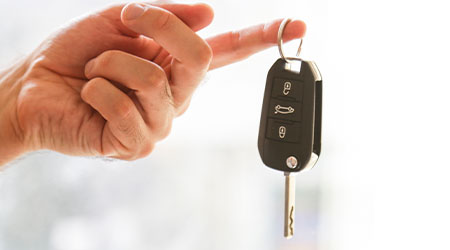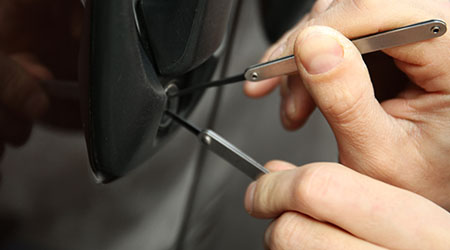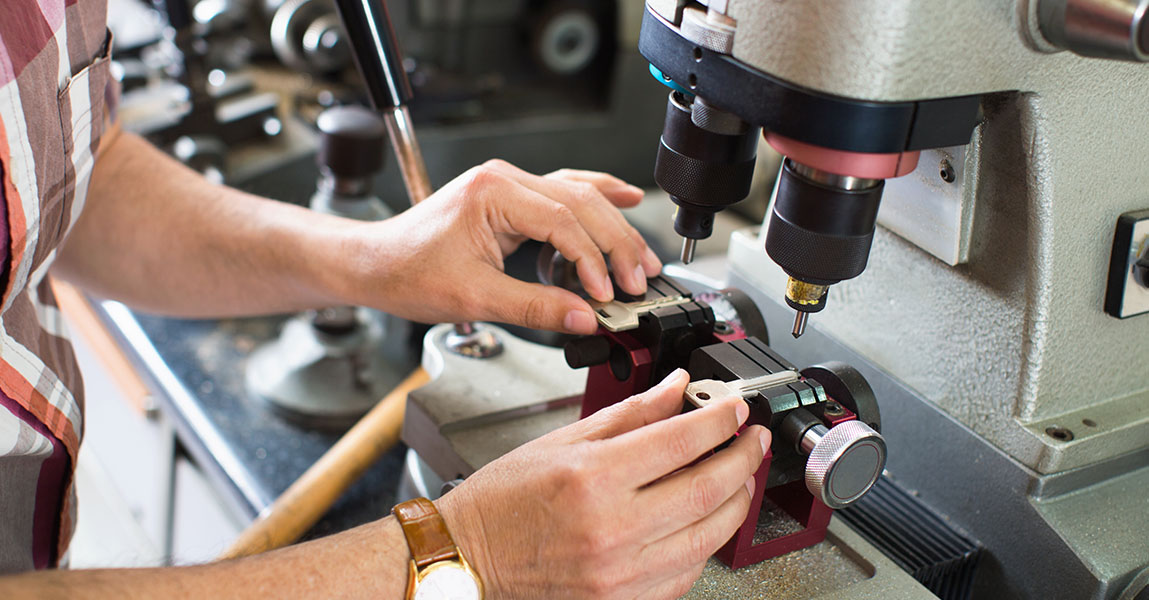Losing control of your car through a key fob can be frustrating, especially when you rely on it every day. One moment it locks or unlocks your doors perfectly, and the next it goes silent with no sign of life. As technology has advanced, key fobs have become more complex and sensitive, which means several small issues can cause them to stop working. Understanding these causes helps us save time, avoid unnecessary panic, and fix the problem effectively.
Dead or Weak Battery
Most key fob problems start with a simple cause: the battery. Every fob relies on a small coin cell battery to send signals to the car’s receiver. These batteries usually last two to three years, but heavy use, extreme temperatures, or long storage periods can shorten their life.
When the battery weakens, the fob may still work occasionally but only at close range. Some drivers mistake this for an antenna or sensor problem. Replacing the battery is usually the first and easiest step. It costs very little and takes just a few minutes. We can avoid future surprises by keeping a spare battery in the glove box and noting when the last replacement was done.
If the new battery does not restore full function, the issue lies deeper—often with the circuitry or the vehicle’s receiver.
Signal Interference
Our modern environments are full of electronic signals. Wi-Fi routers, Bluetooth devices, automatic doors, and even nearby vehicles all send out radio waves. Since most fobs use radio frequency communication, overlapping signals can cause interference.
We might notice this problem in parking garages, gas stations, or near security systems that use similar frequencies. In such cases, the key fob itself is fine, but the car does not receive its signal clearly. Moving a few meters away often solves the issue.
This is especially common in urban areas where several vehicles use keyless systems close together. Parking lots at malls or airports are typical trouble zones. When interference happens repeatedly, reprogramming the key fob can sometimes strengthen the pairing between it and the vehicle’s receiver.
Faulty Fob Buttons or Circuit Damage
The small buttons on a fob endure constant use. Over time, the rubber or plastic around them wears out, allowing dirt or moisture to enter the internal circuit board. Spilled drinks, rain, or high humidity can corrode the metal contacts inside the fob, disrupting communication between the button and the transmitter.
If the lock button stops working but the unlock or panic button still works, the problem is often mechanical rather than electronic. Carefully opening the fob case and cleaning it with a cotton swab and a bit of rubbing alcohol can restore the connection. However, if corrosion has spread, a new fob or professional re-soldering might be necessary.
Since each fob communicates through a unique code sequence, replacing it requires programming to the car. An experienced automotive locksmith in Ottawa can quickly test whether the signal is still being sent and program a new fob if needed.
Broken Key Fob Shell or Internal Damage
Sometimes the issue is not electronic at all but physical. Dropping the fob on concrete or stepping on it can crack the casing or loosen internal components. The circuit board may separate slightly from the battery terminals, cutting power even if the battery itself is good.
We can test this by pressing the buttons firmly while applying gentle pressure to the sides of the case. If it works when squeezed, the casing or internal contact points are likely damaged. In those cases, transferring the internal chip into a new shell can fix the problem without needing to replace the entire fob.
Still, handling these delicate parts requires care. A professional can inspect and repair the casing while keeping the programming intact, which is usually more affordable than dealership replacement.
Programming or Sync Issues
Every car and key fob communicate through a secure code that identifies ownership. If the programming is disrupted, the fob will not work even if the battery and buttons are fine. This can happen after battery disconnection, electrical repair, or even a glitch in the vehicle’s software.
In some models, we can reprogram the key fob at home using a specific combination of key turns and button presses. However, newer vehicles often require specialized diagnostic tools. Reprogramming restores the encrypted connection between the fob and the car’s receiver unit.
If none of the fobs for the same car work, the issue may be with the car’s receiver module rather than the keys themselves. A professional locksmith with automotive programming equipment can determine which side of the system failed and re-sync the components properly.
Damaged Car Receiver or Antenna
When multiple key fobs fail for the same vehicle, it’s time to look beyond the keys. The receiver unit inside the car, which listens for the fob’s signal, can malfunction. Sometimes the antenna wire becomes disconnected or corroded, or a blown fuse cuts power to the receiver.
Moisture and vibration are common causes. If the car was recently detailed or exposed to heavy rain, water may have reached the electronics under the dashboard or near the trunk area where many receiver units are placed.
This issue often appears as intermittent responsiveness—sometimes the car reacts instantly, sometimes not at all. Testing requires diagnostic equipment that can measure the receiver’s response strength. Once the faulty component is located, repair or replacement is straightforward.
Electrical Short or Blown Fuse
The electrical system powering the receiver and door locks depends on several small fuses. A short circuit, moisture exposure, or battery replacement error can blow one of these fuses. When that happens, the key fob may send a signal that the car cannot process.
Checking the vehicle’s fuse box is a quick and often overlooked step. If we find a blown fuse, we should replace it with one of the same rating. Using a higher rating risks damaging other electrical components.
If the new fuse blows again, there may be a deeper short circuit. A professional inspection helps avoid further damage and ensures that the new fuse does not simply mask a larger electrical fault.
Intermittent Power Supply or Car Battery Issues
A weak car battery affects more than just starting the engine. The receiver module for the key fob also depends on consistent voltage. When the battery voltage drops below a certain level, the receiver might not wake up to listen for signals.
We can test this by checking if other electronic functions, like the radio or interior lights, behave oddly. If so, charging or replacing the car battery might solve the problem. Maintaining clean and tight battery terminals also prevents communication drops.
It’s good practice to check both the car and key batteries at the same time when troubleshooting. Doing so rules out overlapping problems and keeps both systems in sync.
Interference from Aftermarket Devices
Aftermarket alarms, remote starters, or dash cameras sometimes interfere with the car’s signal system. These devices share the same electrical lines or frequencies used by the factory-installed receiver.
If the fob stopped working shortly after installing new accessories, disconnecting them temporarily helps confirm the cause. Once identified, rerouting or isolating the wiring usually restores proper function.
Professional locksmiths and technicians often have tools that identify signal interference and can reconfigure devices so that everything works together smoothly.
Software Glitches and Vehicle Memory Errors
Modern vehicles rely heavily on electronic control modules. These small computers manage everything from lighting to locks. Occasionally, a temporary glitch in the software prevents the car from recognizing the key fob.
Resetting the system by disconnecting the car battery for a few minutes can clear stored errors. However, this method can also reset radio settings or clock preferences, so it should be done carefully.
If the problem reappears, it may require a diagnostic scan to identify deeper firmware issues. Manufacturers occasionally release updates to fix such bugs. Getting the latest software version can eliminate recurring key recognition failures.
Hidden Wear and Tear Over Time
Even when used carefully, key fobs endure thousands of presses and environmental stress. The internal solder joints that connect components can weaken over the years. These micro-fractures cause signals to drop intermittently.
We often ignore early signs like reduced range or delayed response. Addressing them early can prevent complete failure. Re-soldering the connections or replacing aging components restores reliability and saves money compared to full replacement.
Routine inspection by a qualified professional once every few years ensures that both the key fob and receiver stay in good shape.
When to Seek Professional Help
While battery replacement and simple cleaning are tasks we can handle ourselves, deeper issues involving programming, receivers, or electrical systems should be handled by experts. A professional locksmith can read the fob’s signal output, verify communication codes, and diagnose the vehicle’s receiver accurately.
If we’re locked out because the key fob suddenly stopped responding, we can contact an emergency specialist through emergency car lockout Ottawa for safe access without damaging the vehicle.
Persistent issues often indicate the need for reprogramming or component replacement. In those cases, it’s best to contact us for direct assistance from professionals who handle key systems daily. Quick action prevents more serious electrical complications and restores peace of mind.
FAQ
Why does my key fob work sometimes but not always?
Intermittent issues usually come from weak batteries, signal interference, or loose internal contacts. Replacing the battery and testing in a different location often reveals the cause.
Can a dead car battery stop my key fob from working?
Yes. The key fob still sends a signal, but the car’s receiver cannot respond if the main battery is too weak. Charging or replacing the car battery restores function.
How do I know if my key fob needs reprogramming?
If a new battery doesn’t help and the buttons still work mechanically, the pairing between the car and fob may have reset. Professional diagnostic tools can confirm and restore programming.
Is it possible to repair a water-damaged key fob?
Light moisture can sometimes be cleaned off if done quickly. If the circuit board shows corrosion or shorting, it usually needs replacement or re-soldering.
What should I do if my spare key fob also stops working?
If both fobs fail, the issue likely lies with the car’s receiver, fuse, or electrical system rather than the keys themselves. Professional testing can pinpoint and fix the problem efficiently.



